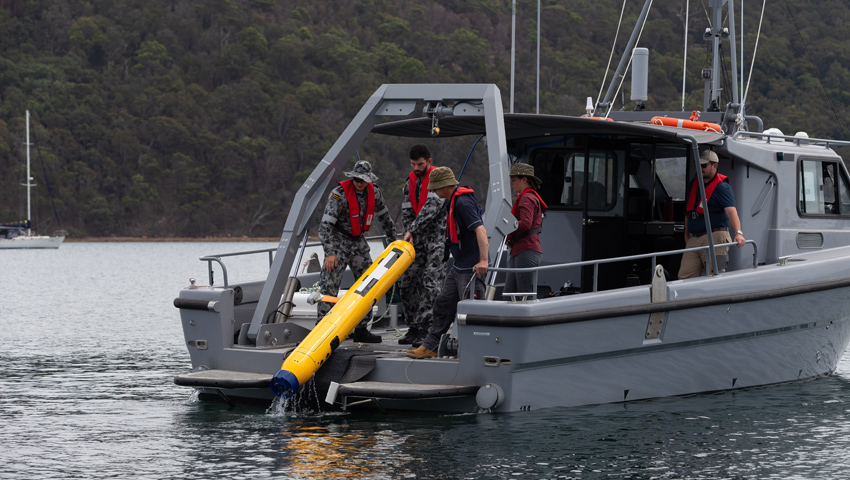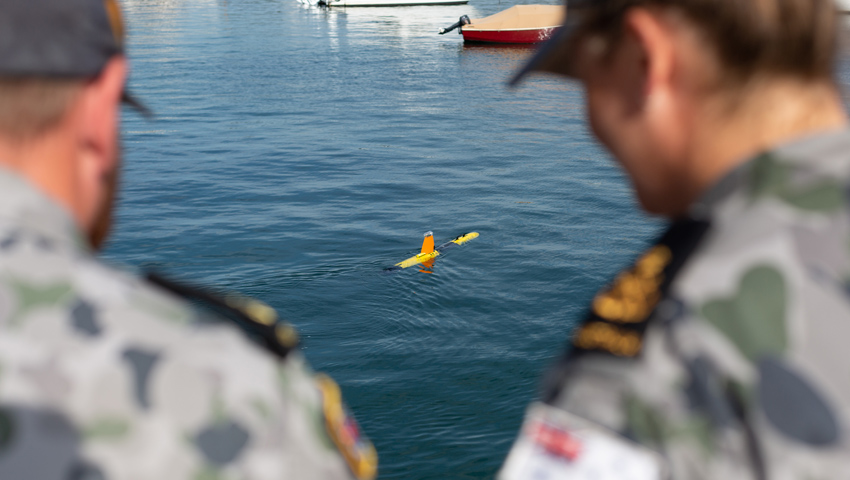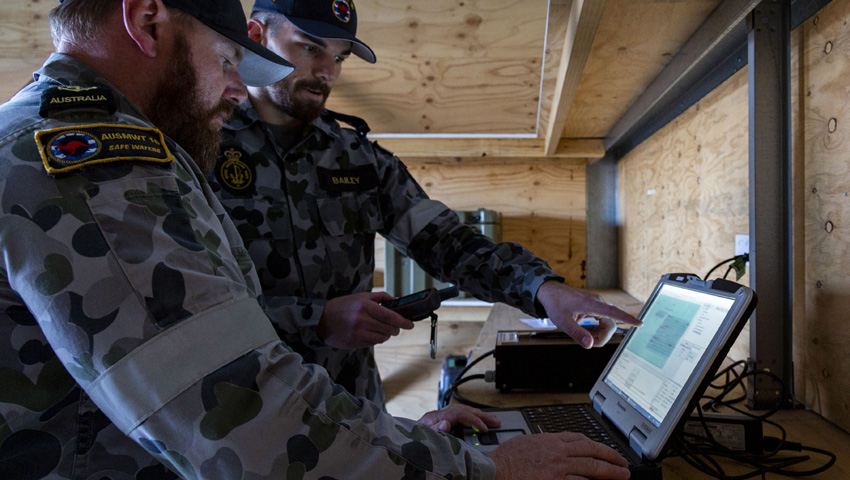AMC Search is leveraging decades of experience to deliver new, cutting-edge maritime training to the Royal Australian Navy.
For over 30 years, AMC Search — the training and consultancy division of the Australian Maritime College (subsidiary of the University of Tasmania) — has delivered courses, bespoke training, vessel-specific training and online/onboard training solutions to the civilian and defence maritime sectors.
The offerings, approved by both the Standards of Training, Certification and Watchkeeping (STCW) and the Australian Maritime Safety Authority (AMSA), have played a critical role in equipping the Royal Australian Navy with the skills to operate the latest naval technology.
Most recently, AMC Search has supported Defence’s SEA 1778 Task Group Mine Countermeasure (MCM) and SEA 1770 Rapid Environmental Assessment – Maritime projects.
The projects aim to offer a pathway for the development and evolution of an off-board robotic technology in support of the Royal Australian Navy’s future MCM and hydrographic operations.
AMC Search’s support for the programs has evolved over time to meet the changing needs of Navy, with additional courses added to its offering.
Chris White, manager, defence and autonomous systems, says AMC is in regular consultation with stakeholders to ensure it’s delivering optimal training solutions.
“It started off with one course and then through stakeholder engagement and close discussions with both project staff and people on the operational teams, we've identified the gaps,” he says.
The courses involve both theoretical and practical components to ensure Navy personnel receive rounded training in preparation for live operations.
White explains: “Take, for example, the basic AUV operator course, we'll have four trainees in the classroom looking at a theoretical concept while the other four are out on the water operating one of our autonomous systems, leveraging the science and technology we've just explained to them.
“There's a real theory to practice transfer.”
The offerings vary in length, with some courses lasting just weeks to cater for the busy schedules of Navy personnel.
One course, the Autonomous Maritime Systems Fundamentals course, runs for just two days, providing trainees with a quick, targeted education on the science, terminology, capability and limitations of the systems.
This course is not designed for personnel operating the systems, but is instead aimed at ensuring those responsible for their oversight are equipped to make informed decisions.


An eye to the future
AMC Search now hopes to build on its treasury of knowledge and expertise by contributing to new and emerging defence projects.
The training and consultancy body has offered its services for the Commonwealth government’s SEA 1905 project, which aims to deliver mine warfare support variants of the Arafura Class offshore patrol vessel (OPV), leveraging robotic and autonomous systems technology.
“We’ve been supporting SEA 1770 and SEA 1778, which are enablers for SEA 1905, so we’re hoping to extend our services for that next level contract to be more equipment specific rather than platform agnostic,” White continues.
AMC Search has responded to the Commonwealth government’s request for information (RFI), and now awaits Defence’s request for tender (RFT), expected later this year.
The training services provider is also working to support the Commonwealth’s broader Robotics, Autonomous Systems and Artificial Intelligence (RAS-AI) Strategy 2040, which aims to advance, transform, and improve Navy’s future warfighting capability.
AMC Search has established an Autonomous Maritime Systems Laboratory (AMSL) — located in the University of Tasmania’s Launceston campus — which focuses on operation and testing both underwater and above-water autonomous technology.
“We’re leveraging our physical assets and the expertise of our staff to support both the operation and training of these technologies,” White adds.
AMSL’s work has included the successful deployment of the ISE Explorer (built by International Submarine Engineering) — an AUV used to gather information about the underwater environment.
The deployments were recognised by the Defence Science and Technology Group (DSTG), which is proposing to leverage AMSL’s technical capabilities to integrate a number of sensors into a bespoke ISE Explorer AUV module to support the SEA 1905 program.
AMC Search is also supporting RAS-AI through its work with the Defence and Maritime Innovation and Design Precinct (DMIDP), which houses research and development (R&D), and operational test and evaluation (T&E) activities at the AMC
As part of the DMIDP initiative, the AMC is proposing the procurement of additional small AUVs and a USV, including the Iver4-580 AUV (built by L3Harris) and a WAM-V 16 USV (built by Marine Advanced Research)— used for intelligence, surveillance and reconnaissance (ISR), anti-submarine warfare (ASW), seabed warfare and mine warfare.
Underpinning AMC’s breadth of work is a deep understanding of the needs of Defence, with a number of staff previously serving in the ADF, including White, who served as a Navy officer for over 20 years.
White’s service included a stint as a Commanding Officer of Clearance Diving Team ONE in Sydney.
“A lot of the training we’ve developed has been modelled and created around structures that are known to Defence,” White said.
“Having ex-defence personnel on staff is fundamental to providing quality services to Defence, I think it’s invaluable.”


